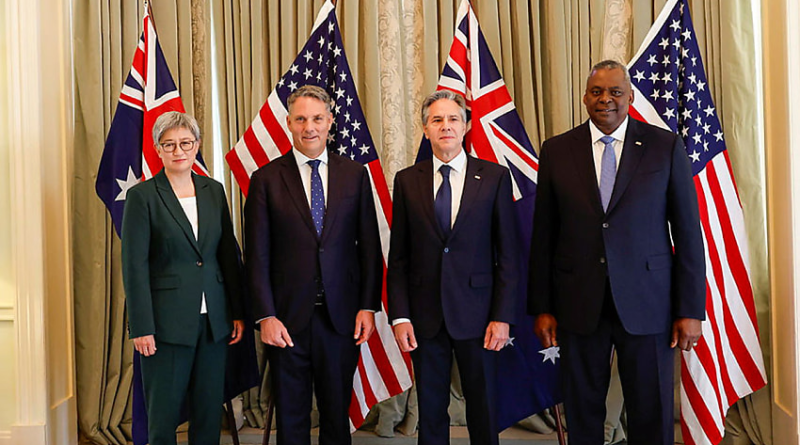United States to Boost Military Rotations in Australia in Reaction to Chinese Communist Party Coercion
Australian and United States defense and foreign affairs officials have issued a warning, stating that Beijing’s actions in the Indo-Pacific region are threatening stability.
Following the latest AUSMIN meeting, top U.S. and Australian officials signed multiple agreements and committed to increasing U.S. military rotations in Australia.
The key officials involved in the U.S.-Australia partnership are Secretary of State Antony Blinken, Secretary of Defense Lloyd J. Austin III, Australian Minister for Foreign Affairs Penny Wong, and Deputy Prime Minister and Minister for Defense Richard Marles.
In a joint statement, they highlighted Beijing’s destabilizing actions in the South China Sea and East China Sea, stating that these actions escalate tensions and disrupt peace and stability in the region.
They specifically mentioned Beijing’s excessive maritime claims in the South China Sea, which they deemed as contradictory to international law and involving unilateral actions to alter the status quo through force or coercion.
Increased U.S. Military Activity in Australia
The statement also outlined plans for enhanced U.S. military involvement in Australia, including more frequent rotational deployments across air, land, and maritime domains, with a focus on northern Australia.
There are ongoing efforts to assess the site at Albury-Wodonga for potential long-term use following the successful “proof of principle prepositioning” of U.S. Army equipment and material. Additionally, requirements are being defined for an enduring logistics support area in Queensland.
Upgrades are also underway at key Australian bases, including RAAF Darwin, Tindal, and potentially at bases in Curtin, Learmonth, and Scherger. Infrastructure improvements at the Cocos Islands base are also being planned with U.S. support.
The statement further detailed joint weapons projects under AUKUS Pillar Two, such as Guided Multiple Launch Rocket Systems (GMLRS), Precision Strike Missiles (PrSM), and a Hypersonic Attack Cruise Missile (HACM), all expected to be ready by 2025.
Concerns Over Beijing’s Influence
The joint statement expressed profound concerns over Beijing’s coercive actions, particularly highlighting recent incidents involving Philippine vessels, unsafe encounters with naval vessels, and disputes in the Taiwan Strait.
The officials urged for dialogue to address issues in the Taiwan Strait peacefully without resorting to force. They reaffirmed their commitment to enhancing economic, trade, and people-to-people ties with Taiwan.
China’s human rights violations in Xinjiang and Tibet, as well as the erosion of autonomy in Hong Kong, were criticized. The officials expressed disappointment over China’s rejection of human rights recommendations and emphasized the importance of maintaining communication channels to prevent misunderstandings and unintended conflict.




